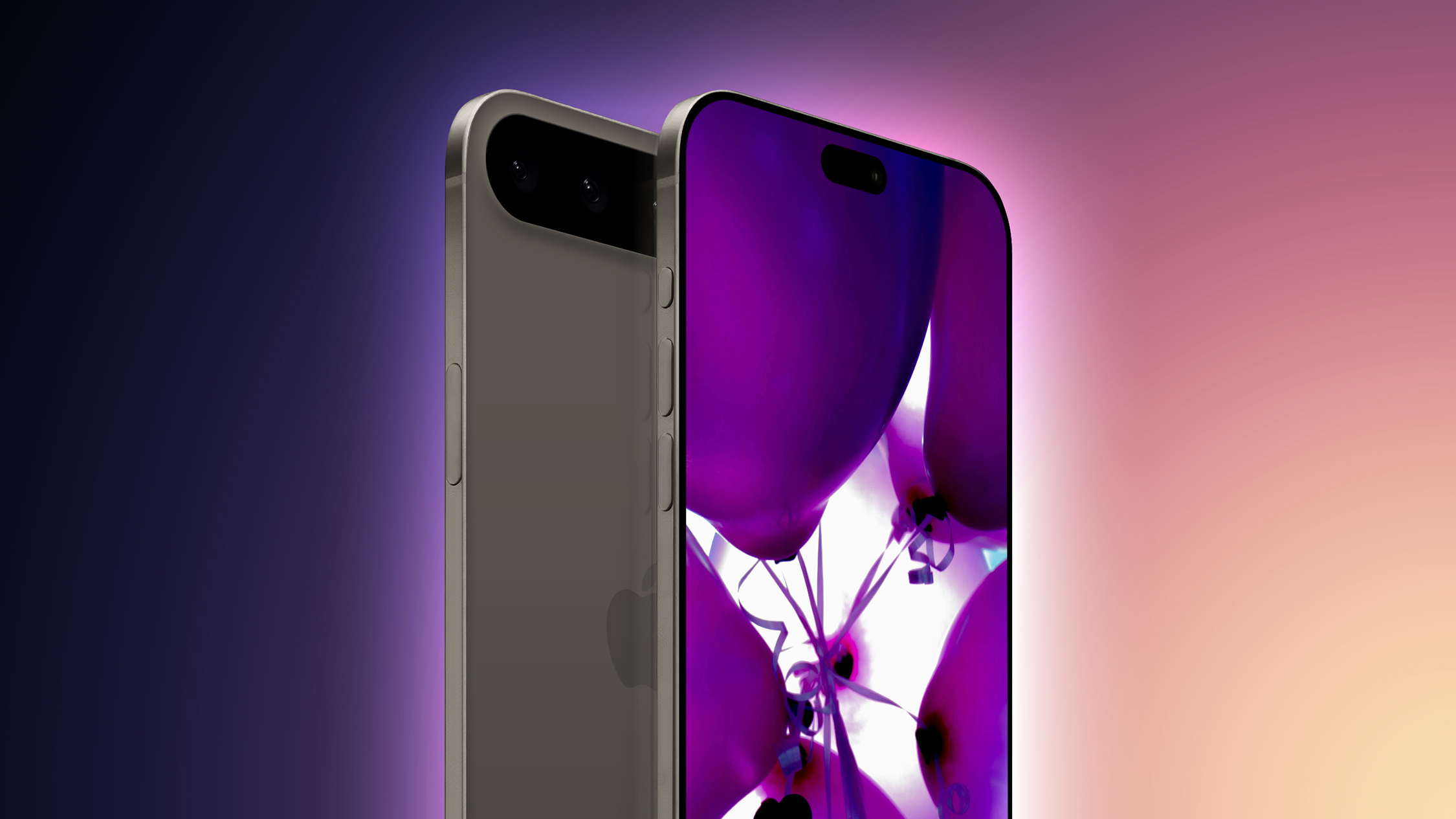
New 'Slim' Design
Rumors have taken to referring to the new iPhone 17 that Apple has planned as the "iPhone 17 Slim," but Apple almost certainly won't use that naming. The "slim" descriptor references the sleeker, thinner design of the device.
With the 12.9-inch M4 iPad Pro model, Apple shaved over a millimeter off of the thickness, resulting in the thinnest device Apple has made to date. That same focus on a svelte design is expected in 2025, and the upcoming iPhone is said to be "significantly thinner" than current iPhones.
We don't know specifics on just how thin Apple is going to make this iPhone, but the iPad Pro is just 5.1mm thick and could serve as a blueprint on what to expect.
As for size, the iPhone 17 Slim is expected to fall somewhere between the 6.1-inch iPhone 15 Pro and the 6.7-inch iPhone 15 Pro. Separate rumors have targeted 6.55 inches, 6.6 inches, and 6.65 inches as the display size that Apple has settled on, which would make it smaller than the iPhone 15 Pro Max (and the rumored iPhone 16 Pro Max).
Though Apple has used titanium for the higher-end iPhone models since last year, the iPhone 17 Slim is rumored to have an aluminum chassis. The first rumors that surfaced about the device actually indicated that it would replace the "Plus" iPhone in Apple's lineup, but later information points toward a new high-end iPhone that's even more expensive than the Pro Max.
Based on the rumors we've heard so far, it sounds like the iPhone 17 Slim will be akin to the 2017 iPhone X. The iPhone X marked a major jump forward in technology, and it was sold alongside the standard iPhone 8 models.
It's sounding like we're going to get an iPhone 17, an iPhone 17 Pro, an iPhone 17 Pro Max, and this new high-end iPhone 17 Slim, with Apple eliminating the Plus model entirely. The iPhone 17 Slim could be more expensive than the iPhone 15 Pro Max, which Apple currently starts at $1,199.
Relocated Cameras
Along with a thinner and lighter design, the high-end iPhone 17 could feature the first major rear camera overhaul. Rumors suggest that the cameras could be relocated from the top-left corner of the iPhone to the top center, which could result in a design similar to the Google Pixel.
The Pixel 8 Pro has a raised band across the back of the device that houses a trio of cameras, a laser detect auto focus sensor, and a flash.
Apple is still testing designs for the iPhone 17, but the relocated camera bump is a possibility.
Display Improvements
ProMotion display technology that allows for variable refresh rates from 1Hz to 120Hz is expected for all iPhone models in 2025, including the high-end model, but the bigger news is that Apple is rumored to be using a new display coating.
The new coating is said to have improved anti-reflective properties and better scratch resistance than the current Ceramic Shield coating. It's been described as a "super-hard anti-reflective layer" in leaks.
Apple has used Ceramic Shield since 2020. It's a ceramic-glass hybrid material developed in partnership with Corning. Corning has since made improvements in its protective glass products, and the company's Gorilla Armor material reduces reflectance by up to 75 percent while also boosting drop protection and scratch resistance. Corning has had a longtime relationship with Apple, and while Gorilla Armor was developed for Samsung, Corning could make a similar product for Apple.
Better Selfie Cam and Dynamic Island Changes
A slimmed down Dynamic Island that takes up less screen space is expected for the new iPhone 17. There have been rumors for years about under-display Face ID technology, and we could see the first hints of it in 2025.
There will be a smaller hole and pill-shaped cutout for the front-facing camera, but it doesn't sound like Apple is going to reach its all-display design goals just yet.
As part of the Dynamic Island redesign, Apple is rumored to be adopting a 24-megapixel front-facing camera, which would be an upgrade over the current 12-megapixel selfie camera. It will feature a six-element lens for improved image quality, and the boost in resolution will capture more detail and allow for more cropping in without sacrificing quality.
Faster Chips
It sounds like iPhone 17 series won't get TSMC's next-generation 2-nanometer chips, but we are expecting A19 chip technology that's likely built on an upgraded 3-nanometer process. Apple typically upgrades iPhones with faster and more efficient chip technology each year, and we're expecting the best chip available in 2025 to be included in the iPhone 17 Slim.
TSMC is working on 2nm chips, but mass production isn't expected until the end of 2025, which would be too late for the iPhone 17 models. If work speeds up, that could change. Compared to 3nm chip technology, 2nm fabrication process could bring a 10 to 15 percent speed improvement at the same power or a 25 to 30 percent power reduction at the same speed.
Chips built on an upgraded 3-nanometer process won't have the same gains as chips built on the 2-nanometer process, but we can still count on modest boosts to CPU and GPU speeds. With Apple's heavy focus on AI, the dedicated Neural Engine for machine learning tasks is also likely to see improvement.
TSMC is working on its N3P process, with mass production set to begin in late 2024. Compared to earlier versions of 3nm chips, the N3P chips offer increased performance efficiency and increased transistor density.
Up to 12GB RAM has been rumored for the high-end iPhone 17 models, and that jump would make sense in the more expensive iPhone 17 Slim. Currently, RAM maxes out at 8GB.
Read More
For more on what to expect from the iPhone 17 lineup in 2025, make sure to check out our iPhone 17 roundup. Our roundups receive regular updates with all of the latest rumors, making them a great resource for tracking rumor development over time.
Related Roundup: iPhone 17
This article, "These 5 Features Will Make the iPhone 17 the Biggest Update in Years" first appeared on MacRumors.com
Discuss this article in our forums








 English (US) ·
English (US) ·